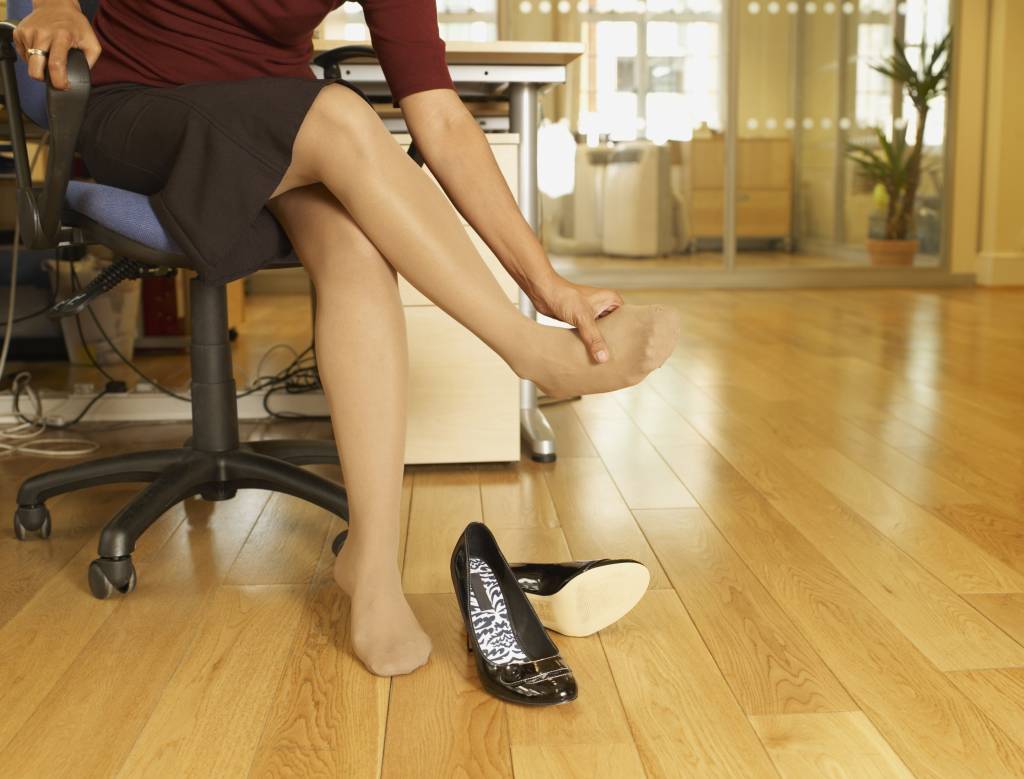Like many people who develop bunions, you’ve likely learned to deal with the pain they cause. Because bunions are a progressive deformity, however, it’s better to address the pain and slow progression.
Before resorting to something drastic like surgery to remove new bony growth, it’s better to try less invasive treatment options. Here are a few ways to treat your bunion pain yourself – and the earlier you try these methods, the better.
 1. Custom Orthotics
1. Custom Orthotics
Many factors can prompt the development of bunions, but faulty foot mechanics are almost always at least somewhat to blame. Certain types of feet are more susceptible to developing bunions, which involve the development of bony prominences caused by the realignment of the joint at the base of the big toe. Custom orthotics that are designed specifically for your foot to ease pressure from the affected area can relieve pain and slow, or even prevent, the progression of bunions.
The primary goal of using orthotics to treat bunions is to position the foot in such a way that its arch is fully and snugly supported. This prevents the foot from flattening out inside of the shoe, which puts excessive pressure on joints. Orthotics that do this are known as total contact orthotics, and it’s important to use this style when treating bunions. Custom orthotics should also be wide in the toe area, with a sturdy “heel counter” (the area that wraps around the heel).
2. Bunion Shields or Pads
Another way to ease pain caused by a bunion is investing in bunion shields, pads, and other corrective devices. These devices are designed to relieve pressure placed on the bunion when wearing closed-toe shoes. Many different options are available, including:
Bunion shields or sleeves: Bunion shields, which are also known as bunion sleeves, cover large portions of the foot. They’re designed to be worn inside shoes, and they work to straighten and protect the joint while relieving pressure on it.
Bunion pads: Unlike bunion shields or sleeves, bunion pads are designed to directly cover the bunion itself. In doing so, they help to limit and prevent scraping, chafing, and other issues that trigger debilitating pain. These pads are available in many materials, including gel, moleskin, and felt.
Bunion splints: When a bunion is still in the early stages, a bunion splint might be used to prevent it from progressing. Bunion splints work by placing the big toe in the correct position. This stretches the soft tissues around the toe, which are usually tight from the deformity.
Toe separators: Less commonly, toe separators might be used to move toes that are angled the wrong way into the correct position.
3. Anti-Inflammatory Medications
Much of the pain associated with bunions is prompted by inflammation and swelling in and around the joint. Therefore, it’s often possible to alleviate bunion pain by taking certain anti-inflammatory medications. A few different options are:
- Aspirin
- Naproxen, which is commonly sold under the brand name Aleve
- Ibuprofen, which is commonly sold under the brand name Advil
The precise type of medication that will provide the most relief will vary depending on a variety of factors. If you have sensitivities to any of the above medications, you can always try a different option to see if it offers relief.
Doctors also sometimes prescribe cortisone injections to alleviate pain from swelling and inflammation in the tissues around the bunion. Although these injections are effective at alleviating the pain, they tend to cause many unpleasant side effects. This is why most people try to stick with over-the-counter anti-inflammatory medications, which don’t tend to cause severe side effects.
Other At-Home Bunion Remedies
Like most people who have bunions, you’d probably like to take care of yours with minimal outside involvement. Fortunately, there are plenty of at-home techniques that offer relief at a very low cost and that may help to ward off additional problems, including:
Rest: Taking breaks to get off of your feet can help to minimize pain from a bunion, and it may help to keep the bunion from progressing.
Wider shoes: Bunion pain is exacerbated by tightly fitting shoes, so look for wider ones if yours fit too snugly around the sides.
Ice packs: When bunion pain flares up—as it often does after being on your feet for extended periods of time—applying an ice pack to the site can help.
Stretching: Certain stretches that help to manipulate the joint may provide relief from bunion pain. Your doctor should be able to instruct you on how to do this properly.
Massage: Regular foot massages can reduce tightness in the area near the bunion, which may provide relief.
Warm soaks: Occasionally soaking your feet in warm water—possibly with Epsom salts or other minerals—is another gentle yet effective way to get relief from bunion pain.
You don’t have to resort to invasive, expensive surgeries to find relief from your bunion pain. Perform some research of your own online to determine which bunion treatment options are the most likely to work for you. You’ll find there are plenty of ways to soothe bunions and prevent them from becoming a bigger problem for free or via affordable remedies.
Like anything, it’s always a good idea to be aware of the latest research. We recommend comparing at least 3 or 4 options before making a final decision. Doing a search online is typically the quickest, most thorough way to discover all the pros and cons you need to keep in mind.


